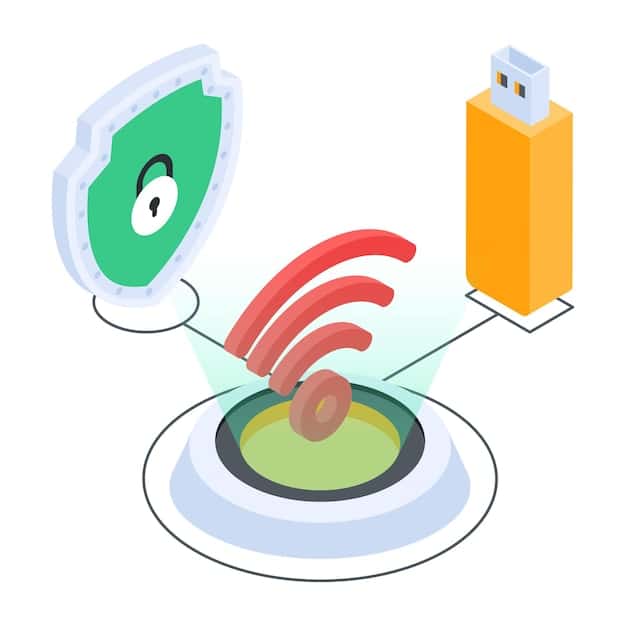VPN vs. Proxy: Which Offers the Best Cybersecurity in the US?

VPNs and proxies both offer cybersecurity protection in the US by masking your IP address, but VPNs provide a more secure, encrypted connection suitable for comprehensive online privacy, while proxies are generally faster and better for bypassing geo-restrictions.
Navigating the digital landscape in the US requires robust cybersecurity measures, and understanding the nuances between a VPN vs. proxy is crucial for making informed decisions about your online protection.
Understanding VPNs and Their Cybersecurity Role
A Virtual Private Network (VPN) is a service that encrypts your internet traffic and routes it through a server in a location of your choice. This process effectively masks your IP address, making it appear as though you are browsing from the VPN server’s location, thus enhancing your security and anonymity.
How VPNs Work
VPNs create a secure tunnel between your device and the internet. This tunnel encrypts all of your traffic, preventing third parties, such as internet service providers (ISPs), hackers, and government agencies, from spying on your online activities.
Key Benefits of Using a VPN
- Enhanced Security: Encryption ensures that your data remains private even on public Wi-Fi networks.
- Privacy Protection: Hides your IP address, making it difficult to track your online activities.
- Bypassing Geo-Restrictions: Access content that may be restricted in your current location.
VPNs are particularly beneficial for individuals who handle sensitive information, such as financial data or personal communications, and for those who frequently use public Wi-Fi networks, which are often unsecured and vulnerable to cyber threats.
Exploring Proxies and Their Cybersecurity Features
A proxy server acts as an intermediary between your device and the internet. When you use a proxy, your internet traffic is routed through the proxy server before reaching its destination. This masks your IP address, providing a degree of anonymity.

Types of Proxies
There are several types of proxies, each offering varying levels of privacy and security.
- HTTP Proxies: Primarily used for web browsing, these proxies handle HTTP and HTTPS traffic.
- SOCKS Proxies: More versatile than HTTP proxies, SOCKS proxies can handle any type of traffic, including email, FTP, and torrents.
- Transparent Proxies: Often used by organizations to monitor internet usage, these proxies do not hide your IP address.
The choice of proxy depends on your specific needs and the level of security you require. SOCKS proxies generally offer better security than HTTP proxies due to their ability to handle a wider range of traffic types.
Advantages of Using Proxies
Proxies offer several advantages, particularly in terms of speed and ease of use.
- Faster Speeds: Proxies can sometimes provide faster speeds than VPNs, especially if the proxy server is located closer to your actual location.
- Bypassing Geo-Restrictions: Like VPNs, proxies can be used to access content that is restricted in your current location.
- Ease of Use: Setting up a proxy is often simpler than setting up a VPN, making it a convenient option for basic privacy needs.
Key Differences Between VPNs and Proxies
While both VPNs and proxies mask your IP address, there are significant differences in terms of security, speed, and overall functionality.
VPNs offer comprehensive encryption, securing all of your internet traffic and providing a higher level of privacy and security. Proxies, on the other hand, typically do not offer encryption, making them less secure.
Security and Encryption
VPNs encrypt all of your internet traffic, protecting it from prying eyes. Proxies, in most cases, do not offer encryption, leaving your data vulnerable to interception.
Speed and Performance
Proxies can sometimes offer faster speeds than VPNs, especially if the proxy server is located closer to your actual location. However, this speed advantage comes at the cost of security.
Privacy Levels
VPNs provide a higher level of privacy by hiding your IP address and encrypting your traffic. Proxies also hide your IP address, but they do not encrypt your traffic, making them less effective at protecting your privacy.
The choice between a VPN and a proxy depends on your specific needs. If security is your primary concern, a VPN is the better option. If you prioritize speed and ease of use, a proxy may be sufficient.
Cybersecurity Benefits of VPNs in the US Context
In the US, where data privacy laws are evolving and cyber threats are increasingly sophisticated, VPNs offer significant cybersecurity benefits.

Protecting Against Surveillance
VPNs can help protect you from government surveillance and data collection by encrypting your internet traffic and hiding your IP address. This makes it more difficult for third parties to track your online activities.
Securing Public Wi-Fi Connections
Public Wi-Fi networks are often unsecured, making them vulnerable to cyber attacks. VPNs encrypt your traffic, protecting your data from being intercepted by hackers on public Wi-Fi.
Bypassing ISP Throttling
Some ISPs may throttle your internet speed for certain types of traffic, such as streaming or torrenting. VPNs can help bypass this throttling by hiding your traffic from your ISP.
For users in the US, a VPN can be an essential tool for protecting their online privacy and security, especially in the face of increasing cyber threats and surveillance.
Cybersecurity Limitations of Proxies in the US Context
While proxies offer some benefits, they also have significant limitations in terms of cybersecurity, especially in the US context.
Lack of Encryption
The primary limitation of proxies is the lack of encryption. Without encryption, your internet traffic can be intercepted and read by third parties, exposing your sensitive data.
Limited Privacy
Proxies hide your IP address, but they do not encrypt your traffic, making them less effective at protecting your privacy. Your ISP and other third parties can still see your online activities.
Potential for Logging
Some proxy providers may log your internet traffic, which can be a privacy concern. It is important to choose a reputable proxy provider that does not log your data.
In the US, where privacy laws are not as strong as in some other countries, the limitations of proxies can be particularly problematic. Users who prioritize privacy and security should opt for a VPN instead.
Making the Right Choice for Your Needs
Choosing between a VPN vs. proxy depends on your specific needs and priorities. If you prioritize security and privacy, a VPN is the better option. If you prioritize speed and ease of use, a proxy may be sufficient.
When to Use a VPN
- When you need to protect sensitive data, such as financial information or personal communications.
- When you are using public Wi-Fi networks.
- When you want to bypass censorship or access geo-restricted content.
When to Use a Proxy
- When you need to bypass geo-restrictions and speed is more important than security.
- When you want to hide your IP address for basic privacy needs.
- When you need a quick and easy solution for accessing blocked content.
Ultimately, the decision between a VPN and a proxy depends on your individual circumstances. Consider your needs carefully and choose the option that best meets those needs.
| Key Feature | Brief Description |
|---|---|
| 🛡️ Encryption | VPN encrypts data; proxy does not, offering a secure tunnel. |
| 🌐 IP Masking | Both hide your IP, but VPN provides greater privacy. |
| 🚀 Speed | Proxy can be faster for bypassing geographical restrictions. |
| 🔒 Security | VPNs offer better overall security for internet traffic. |
Frequently Asked Questions
▼
The major difference is that a VPN encrypts all your internet traffic, offering strong security, while a proxy primarily masks your IP address without encryption, suitable for basic bypassing needs.
▼
A proxy might offer slightly better speeds, potentially reducing lag, making it preferable for gaming if security is less of a concern than speed.
▼
A proxy hides your IP address, but because it doesn’t encrypt traffic, it offers minimal protection on public Wi-Fi; a VPN is safer for those connections.
▼
Yes, VPNs are legal to use in the US. They are commonly used to enhance privacy and security, and to access content from different regions.
▼
Setting up a VPN typically involves installing VPN software or using built-in settings. Proxies can be configured directly in your browser or system settings.
Conclusion
In conclusion, both VPNs and proxies offer ways to enhance your online privacy, but they do so with varying levels of security. For users in the US, understanding the nuances of a VPN vs. proxy is essential for making informed decisions about your cybersecurity needs. Prioritize a VPN for robust protection or a proxy for simpler tasks where speed is key.





